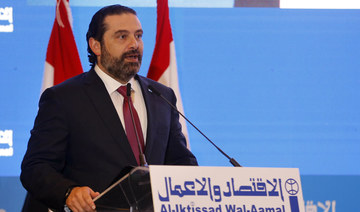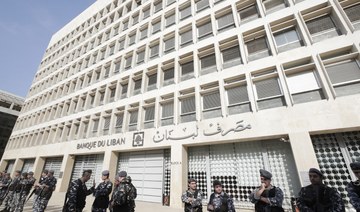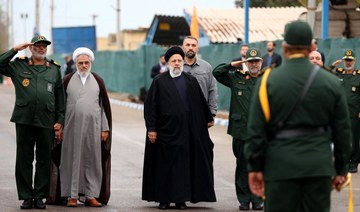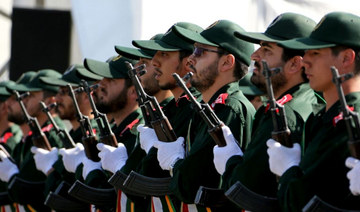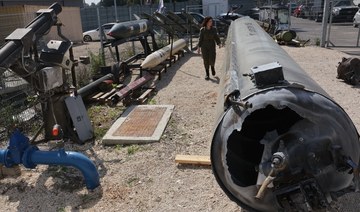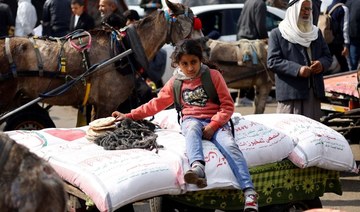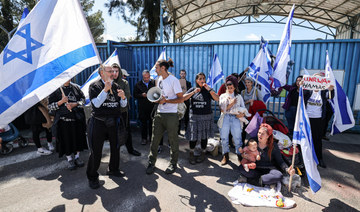BEIRUT: For days, Lebanese TV stations have been blanketed with live coverage as lawmakers held heated debate over a controversial austerity budget meant to salvage the flailing economy, with protests outside parliament and critics denouncing its focus on tax hikes and wage cuts. Mohammed Badran, sitting in his barber shop empty of customers, couldn’t be bothered to watch.
Those officials don’t even know how much bread costs, he scoffed. “They basically don’t know anything about us.” The 33-year-old hair stylist — his hair spiked stylishly in front — sat idle in his salon in central Beirut with the TV tuned to Qur’anic recitals.
Badran said things have gotten worse the past four years. Taxes, utility bills and prices have increased, while his income hasn’t changed. Once, he kept about three quarters of his earnings; now he pockets only about a quarter, he said.
“Things have been turned upside down,” Badran said.
As the economic crisis deepens in Lebanon, so has the public’s distrust in the ability of the old political class, widely viewed as corrupt and steeped in personal rivalries, to tackle major reform. Many fear a Greek-style bankruptcy, without the European Union to fall back on and with potentially more violent social unrest in the small country wedged between war-torn Syria and Israel.
A new budget that reduces public debts, improves governance and reforms infrastructure could unlock some $11 billion in aid promised to Lebanon last year by European countries. But after weeks of delay amid haggling among the government and lawmakers, the result is a bill that mostly taps into the pockets of average Lebanese, while critics say it does little to tackle structural issues and deeply entrenched corruption at the root of the crisis.
The final vote on the budget is expected Friday, unless more delays occur. It is expected to pass overwhelmingly.
Still, during three days of live-televised debate this week, a line of lawmakers took to the podium to rail against it — most of them members in the government that designed it. In his speech Thursday, the finance minister snapped back, saying they were treating the budget like an “abandoned baby” no one would admit to fathering.
Critics said the theatrics were designed to absorb public anger over an economic slump that has hit hard.
Growth reached an all-time low of 0.2 percent last year. It slowed further after the Central Bank halted subsidized housing loans through commercial banks, contracting the real estate market, a main engine for growth since 2012. The budget deficit reached 11 percent of GDP, up from 8.6 percent in 2017, and public debt stands at 150% of GDP, one of the highest in the world. Fuel imports have increased, further deepening a trade deficit.
The downturn has impacted the country’s trusted banking sector. The Central Bank’s foreign assets have receded by around $6 billion since last year, as it props the currency pegged to the dollar. Deposit growth has been the lowest since 2005 as some people transfer savings abroad.
Meanwhile, some businesses have liquidated and shops have closed. More apartments are up for sale, deflating prices.
The budget submitted to the parliament aims to bring the deficit for 2019 down to 7.6 percent, though the International Monetary Fund projects it will likely be at 9.75 percent.
Last year, the government hiked the value-added tax to finance a pay increase it promised to public sector workers. This year’s proposed new budget cuts pay and benefits for government workers and freezes public sector hiring for three years. The VAT hike remains in place, and other taxes are also increased.
Economist Jad Chaaban said the anxiety around a potential Greek-style bankruptcy has allowed government officials to push an emergency fix rather than enact major changes, such as progressive taxes or debt restructuring.
The real problem, he said, is the political elite, which treats the public sector as a jobs source for supporters and covers up corruption that enriches them and drives up debt. Commercial banks are largely owned by ruling politicians and profit from holdings of public debt.
Chaaban and other critics say officials have tried to divert bitterness over the economy by campaigning against the nearly 1.1 million Syrian refugees in Lebanon, calling for their return and clamping down on illegal labor.
For Badran, economic hardship has curbed even the simplest of dreams. He dropped plans to build a solarium at his salon. After 14 years of owning his shop, he still lives with his parents, unable to afford marriage.
In the last year, his profits maxed at $500 a month in the face of increasing bills, rent and costs. Like all Lebanese, he pays one electricity bill to the government and a separate one to a private generator provider to fill in during daily power cuts caused by the decrepit infrastructure.
“Ever since I can remember, there has been no electricity, no water. Now I am 33 years old, and we still complain of the water and electricity,” Badran said. “Look next door, in Syria, there is war and all that, and it has electricity and water. Here, we have charlatans.”
With mounting costs — hair gel prices have gone up by 30 percent, for example — he has cut back on supplies for the salon as well as personal spending.
Most of his young, stylish clientele have also cut back, coming to his shop once a month instead of three times.
Once the new budget passes, Badran said he’ll likely have to raise his prices for the first time in years, adding to the burden on his regulars, many of whom already work two jobs.
“I have been buttering up my clients so as not to lose them,” he said.
Along one street in the busy commercial neighborhood of Mar Elias, known for its jewelry stores, at least four shops had “For Sale” signs in the window.
Among them was emptied-out family gold shop. Maha, a 34-year-old, staffed the shop with her uncle on a recent day. The family still has its wholesale gold business but can’t keep running an idle retail shop, they said. Both refused to give their last name to protect the family’s commercial reputation and private plans.
Maha said only the middle class feels the economic pain since the wealthy and government officials stash their money abroad.
“People ask why we don’t protest. Look around us what happened when people protested?” she said. “Look at Egypt, or even worse Syria. We will end up in a worse place.”
Lebanese losing faith as politicians fumble over economy
Lebanese losing faith as politicians fumble over economy
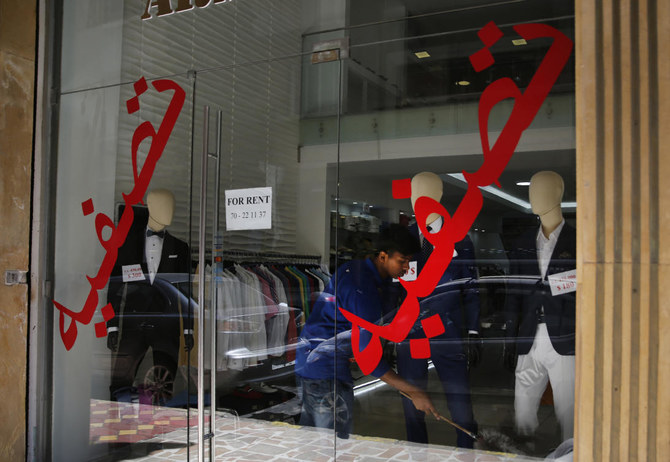
- As the economic crisis deepens in Lebanon, so has the public’s distrust in the ability of the old political class
- Many fear a Greek-style bankruptcy, without the European Union to fall back on and with potentially more violent social unrest
Dubai Airport will return to full operational capacity within 24 hours, COO says
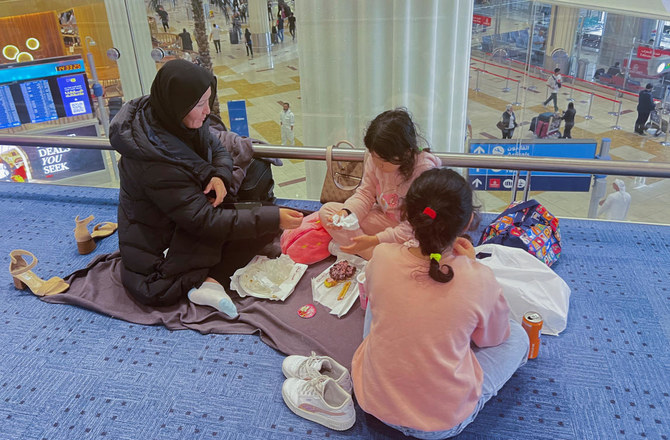
- The hub has struggled to clear a backlog of flights in the aftermath of heavy rain that swamped the United Arab Emirates on Tuesday
The hub has struggled to clear a backlog of flights in the aftermath of heavy rain that swamped the United Arab Emirates on Tuesday.
“Once operations are back to normal, we will assess the damages and would be able to give figure for the size of losses,” Al Joker told Al Arabiya TV in a televised interview.
British MPs urge government to designate IRGC a terror group
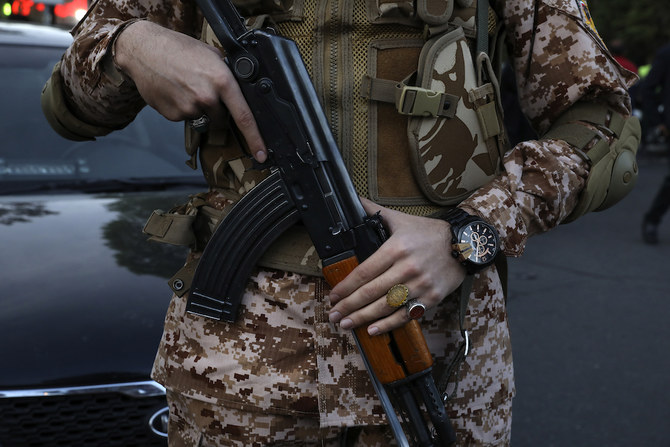
- Signatories to open letter say Iranian organization has ‘never posed a greater threat to UK’
- Proscription would put Islamic Revolutionary Guard Corps on par with Daesh, Al-Qaeda
LONDON: A cross-party group of more than 50 MPs and Lords peers in the UK have demanded that Iran’s Islamic Revolutionary Guard Corps be designated a terrorist organization.
The cross-party group, which includes former home secretaries Suella Braverman and Priti Patel, made the request in an open letter to The Times.
The IRGC is a key component of Iran’s military and power-projection capabilities. More than 125,000 personnel serve in its ranks, spread across wings including the Quds Force, the overseas element responsible for liaising with and supporting militias in Yemen, Lebanon, Iraq and Syria. In recent years, the IRGC has also built a relationship with Hamas in the Gaza Strip.
The open letter, signed by 134 people, follows last weekend’s Iranian attack on Israel, which signatories described as the “latest chapter of destructive terror by the IRGC.”
It says: “The government has combated extremism and terrorism by proscribing Hamas and Hezbollah but it is not enough.
“The IRGC is the primary source of ideological radicalisation, funding, equipment and training for these groups.
“The government must act against the root cause and proscribe the IRGC as a terrorist organisation.”
Iran’s attack was a response to Israel’s strike on its consulate in Damascus that killed 11 people, including senior commanders.
Former US President Donald Trump designated the IRGC as a terrorist organization in 2019, a year before the assassination of Qassem Soleimani, head of the Quds Force.
But the UK has been reluctant to follow the US measure for fear of breaking diplomatic communication channels with Tehran.
As part of sanctions on Iran targeting its nuclear program, however, the UK sanctioned the IRGC, freezing the assets of its members and implementing travel bans.
A terrorist designation in the UK would put the IRGC on par with Daesh and Al-Qaeda, and make it illegal to support the group, with a maximum penalty of 14 years’ imprisonment.
The 134 signatories said the IRGC has “never posed a greater threat to the UK,” accusing “thugs” belonging to the group of stabbing an Iranian dissident in London last month.
The letter was coordinated by the UK-Israel All Parliamentary Party Group, which includes former Immigration Minister Robert Jenrick.
Iran tells US it does not seek ‘expansion of tensions’
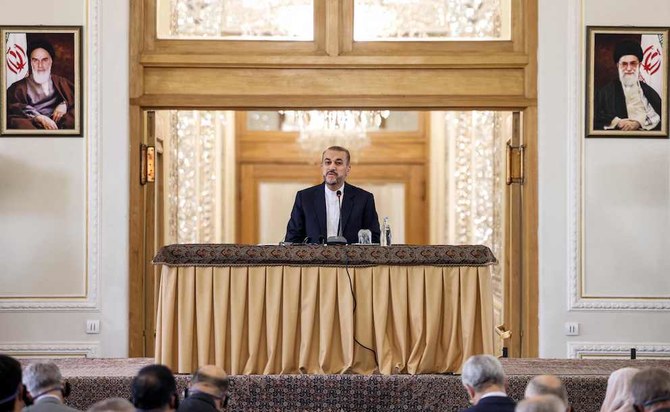
- Tehran carried out its first-ever direct attack on Israel, firing drones and missiles on the weekend
- Top envoy: Iran communicated with Washington ‘before and after’ launching its attack on Israel
TEHRAN: Iran’s top diplomat said Thursday his country has told the United States that it is not seeking escalation after an unprecedented attack on Israel.
The Islamic republic carried out its first-ever direct attack on Israel, firing drones and missiles on the weekend. The barrage — to which Israel’s army chief has vowed a response — was retaliation for an April 1 air strike on Tehran’s consulate in Damascus. Iran blamed Israel for the consular attack.
Foreign Minister Hossein Amir-Abdollahian, who is in New York to attend a UN Security Council meeting, said his country has “tried to tell the United States clearly” that Iran is “not looking for the expansion of tension in the region,” he said in a video posted by his ministry.
Iran and the United States have had no diplomatic relations since 1980, but neutral Switzerland represents Washington’s interests in Iran. Both the US and Iran have alluded to the Swiss role as an intermediary.
According to Amir-Abdollahian, Iran communicated with Washington “before and after” launching its attack on Israel.
Iran informed the United States that the decision by the Islamic Republic of Iran to “respond to the (Israel) regime is final,” and the matter concluded, he said.
Iran’s retaliation against Israel left a girl severely wounded but caused little damage. It followed the strike in Damascus that killed seven members of Iran’s Islamic Revolutionary Guards Corps, including two generals.
“Before the operation, we clearly told the American side that we will not target American bases and interests in the region,” Amir-Abdollahian said.
The Islamic republic has celebrated the attack as a success but President Ebrahim Raisi warned of “a fierce and severe response” to further “aggression” by Israel.
During his trip to New York, Amir-Abdollahian is set to meet United Nations Secretary-General Antonio Guterres and his counterparts from other countries.
The United States, Israel’s top ally, has said it would soon impose new sanctions on Iran’s missile and drone program following the strike on Israel, and said it expects allies to take parallel measures.
The US and other allies helped Israel intercept the Iranian strike.
Call to close UNRWA is attempt to strip Palestinians of refugee status — agency chief
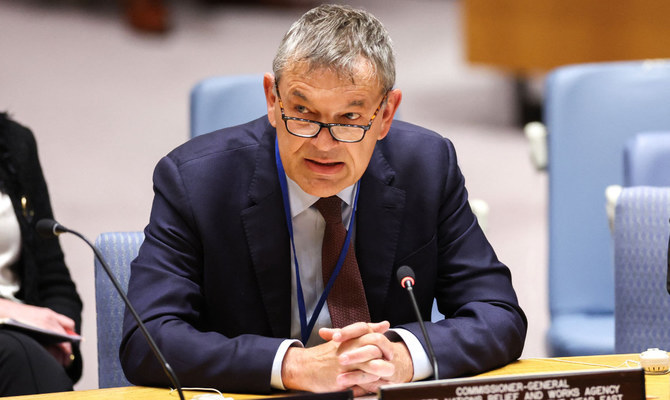
- Philippe Lazzarini tells Security Council demise of agency would also accelerate onset of famine in Gaza, and jeopardize transition from a ceasefire to recovery
- Meeting of the council requested by Jordan in response to long-running, continual attempts by Israel to force the agency out of Gaza and have it dismantled entirely
NEW YORK CITY: Disbanding the UN Relief and Works Agency for Palestine Refugees would have lasting repercussions for millions of Palestinians because it would result in them being stripped of their refugee status, the head of the agency told the Security Council on Wednesday.
Philippe Lazzarini warned it would also accelerate the onset of famine in Gaza, and jeopardize the eventual transition from a ceasefire to recovery by depriving a traumatized population of the essential services it requires.
Some of the ramifications would be long term, he added: “It will make impossible the formidable task of bringing half a million deeply distressed girls and boys back to learning. Failing to deliver on education will condemn an entire generation to despair, fueling anger, resentment, an endless cycle of violence.”
The meeting of the council was requested by Jordan in response to long-running, continual attempts by Israeli authorities to force the agency out of Gaza, and have it dismantled entirely.
It began with a minute’s silence in honor of the 178 UNRWA employees killed during the war in Gaza.
The agency has been facing great challenges not only in its efforts to provide humanitarian assistance to Palestinian civilians in Gaza, but also in ensuring it is able to continue its operations more generally.
More than 163 UNRWA installations in the Gaza Strip have been damaged during the war between Israel and Hamas, and only nine of its 24 healthcare facilities remain operational.
Meanwhile, the agency has been in a precarious financial position for some time, in part because of the decision by some major donor nations to suspend the funding they provide for the agency, which threatened to bring its operations grinding to a halt.
Several countries put their donations on hold after Israeli authorities alleged in January, without providing any supporting evidence, that 12 UNRWA workers had played a role in the Oct. 7 attacks by Hamas on Israel.
The agency terminated the contracts of the employees identified in the allegations, and the Office of Internal Oversight Services, the UN’s main investigative body, launched an inquiry at the request of UN Secretary-General Antonio Guterres.
Separately, the UN also ordered an independent review, led by the French former minister of foreign affairs, Catherine Colonna, of the steps the agency takes to uphold the principle of neutrality among its workers. The review group is expected to present its findings on April 20.
Lazzarini told council members on Wednesday that the real reason behind the Israeli calls for UNRWA to be closed down is not about its adherence to humanitarian principles, it is an attempt to end the refugee status of millions of Palestinians. The true aim is to change the long-standing political parameters for peace in the Occupied Palestinian Territories, he added.
“Accusations that UNRWA has deliberately perpetuated Palestinians’ refugee status are false and dishonest,” Lazzarini said. “The agency exists because a political solution does not. It exists in lieu of a state that can deliver critical public services.
“The international community has long attempted to contain, rather than resolve, the Israeli-Palestinian conflict. Lip service is paid to the two-state solution each time an escalation occurs, costing lives and hope.
“UNRWA was created 75 years ago as a temporary agency, a stop-gap measure, pending a political answer to the question of Palestine.
“If the international community truly commits to a political solution, UNRWA can retrieve its temporary nature by supporting a time-bomb transition, delivering education, primary healthcare and social support. It can do so until a Palestinian administration takes over the services.”
Russia’s permanent representative to the UN, Vasily Nebenzia, called on the Security Council to consider, as a matter of urgency, imposing sanctions on Israel for its failure to implement the council’s recent ceasefire resolution.
“Everyone knows about the facts, the unthinkable statistics, the number of people dead and those in need of urgent food and medical assistance, as well as reported cases of people dying of famine and dehydration, including minors,” he said.
“The IDF (Israel Defense Forces) is blocking half of humanitarian convoys, yet aid supplies are waiting at the border. We warned time and time again that in the absence of a lasting, sustainable ceasefire, which must be duly monitored by military observers, all of our humanitarian efforts are doomed.”
The US deputy ambassador to the UN, Robert Wood, said the conflict in Gaza has been one of the worst in recent memory in terms of the number of aid workers killed, with the total standing at more than 240 since Oct. 7.
“These incidents are unacceptable. Humanitarian personnel must be protected, full stop,” he said, and he expressed deep concern that “Israel has not done enough to protect humanitarian aid workers or civilians.”
Wood added: “UNRWA plays a crucial role throughout the region, contributes to stability of the region and supporting Palestinian refugees, to educating hundreds of thousands of students, to providing primary healthcare and critical relief and social services.
“UNRWA is the bedrock of support for the most vulnerable Palestinian refugees in Jordan, Lebanon, Syria and the West Bank. The United States supports this important work and emphasizes that it must continue uninterrupted.”
Call to close UNRWA is attempt to strip millions of Palestinians of refugee status: agency chief
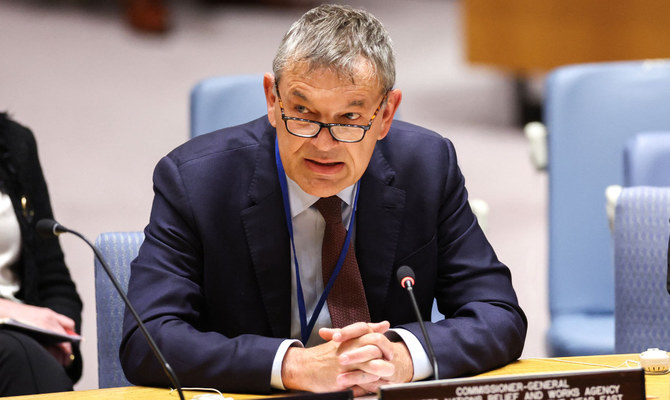
- Philippe Lazzarini tells Security Council demise of agency would also accelerate onset of famine in Gaza, and jeopardize transition from a ceasefire to recovery
- Meeting of the council requested by Jordan in response to long-running, continual attempts by Israel to force the agency out of Gaza and have it dismantled entirely
NEW YORK CITY: Disbanding the UN Relief and Works Agency for Palestine Refugees would have lasting repercussions for millions of Palestinians because it would result in them being stripped of their refugee status, the head of the agency told the Security Council on Wednesday.
Philippe Lazzarini warned it would also accelerate the onset of famine in Gaza, and jeopardize the eventual transition from a ceasefire to recovery by depriving a traumatized population of the essential services it requires.
Some of the ramifications would be long term, he added: “It will make impossible the formidable task of bringing half a million deeply distressed girls and boys back to learning. Failing to deliver on education will condemn an entire generation to despair, fueling anger, resentment, an endless cycle of violence.”
The meeting of the council was requested by Jordan in response to long-running, continual attempts by Israeli authorities to force the agency out of Gaza, and have it dismantled entirely.
It began with a minute’s silence in honor of the 178 UNRWA employees killed during the war in Gaza.
The agency has been facing great challenges not only in its efforts to provide humanitarian assistance to Palestinian civilians in Gaza, but also in ensuring it is able to continue its operations more generally.
More than 163 UNRWA installations in the Gaza Strip have been damaged during the war between Israel and Hamas, and only nine of its 24 healthcare facilities remain operational.
Meanwhile the agency has been in a precarious financial position for some time, in part because of the decision by some major donor nations to suspend the funding they provide for the agency, which threatened to bring its operations grinding to a halt.
Several countries put their donations on hold after Israeli authorities alleged in January, without providing any supporting evidence, that 12 UNRWA workers had played a role in the Oct. 7 attacks by Hamas on Israel.
The agency terminated the contracts of the employees identified in the allegations, and the Office of Internal Oversight Services, the UN’s main investigative body, launched an inquiry at the request of UN Secretary-General Antonio Guterres.
Separately, the UN also ordered an independent review, led by the French former minister of foreign affairs, Catherine Colonna, of the steps the agency takes to uphold the principle of neutrality among its workers. The review group is expected to present its findings on April 20.
Lazzarini told council members on Wednesday that the real reason behind the Israeli calls for UNRWA to be closed down is not about its adherence to humanitarian principles, it is an attempt to end the refugee status of millions of Palestinians. The true aim is to change the long-standing political parameters for peace in the Occupied Palestinian Territories, he added.
“Accusations that UNRWA has deliberately perpetuated Palestinians’ refugee status are false and dishonest,” Lazzarini said. “The agency exists because a political solution does not. It exists in lieu of a state that can deliver critical public services.
“The international community has long attempted to contain, rather than resolve, the Israeli-Palestinian conflict. Lip service is paid to the two-state solution each time an escalation occurs, costing lives and hope.
“UNRWA was created 75 years ago as a temporary agency, a stop-gap measure, pending a political answer to the question of Palestine.
“If the international community truly commits to a political solution, UNRWA can retrieve its temporary nature by supporting a time-bomb transition, delivering education, primary healthcare and social support. It can do so until a Palestinian administration takes over the services.”
Russia’s permanent representative to the UN, Vasily Nebenzia, called on the Security Council to consider, as a matter of urgency, imposing sanctions on Israel for its failure to implement the council’s recent ceasefire resolution.
“Everyone knows about the facts, the unthinkable statistics, the number of people dead and those in need of urgent food and medical assistance, as well as reported cases of people dying of famine and dehydration, including minors,” he said.
“The IDF (Israel Defense Forces) is blocking half of humanitarian convoys, yet aid supplies are waiting at the border. We warned time and time again that in the absence of a lasting, sustainable ceasefire, which must be duly monitored by military observers, all of our humanitarian efforts are doomed.”
The US deputy ambassador to the UN, Robert Wood, said the conflict in Gaza has been one of the worst in recent memory in terms of the number of aid workers killed, with the total standing at more than 240 since Oct. 7.
“These incidents are unacceptable. Humanitarian personnel must be protected, full stop,” he said, and he expressed deep concern that “Israel has not done enough to protect humanitarian aid workers or civilians.”
Wood added: “UNRWA plays a crucial role throughout the region, contributes to stability of the region and supporting Palestinian refugees, to educating hundreds of thousands of students, to providing primary healthcare and critical relief and social services.
“UNRWA is the bedrock of support for the most vulnerable Palestinian refugees in Jordan, Lebanon, Syria and the West Bank. The United States supports this important work and emphasizes that it must continue uninterrupted.”



